Giáo trình Speaking 3 (Phần 2)
I. WARM-UPS:
* In five minutes, write down two jobs which:
1. can be done by robots
2. no longer exist
3. require absolutely no intelligence
4. have low salaries but high prestige
5. require very long training
6. will be most needed in the future
7. are overpaid
8. young children typically want to do
9. can be done from home
10. you would really hate to do
For example:
1. a builder, a traffic warden
2. a fire- cracker maker
3. a cleaner, a baby-sitter
4. a doctor, a teacher
5. a doctor, a pilot
6. a computer progammer, an architect working on space
7. an air steward/ stewardess
8. a singer, a TV speaker
9. a house wife, a writer
10. a cleaner, an assembly line worker
* Discuss and dispute your answers and the reasons why you have chosen those jobs.
II. WHAT IS WORK?
1. Read the quotation by Andy Warhol, the American pop artist and then brainstorm on
the concept of “work”. Answer question 1.
- Discuss the questions 2, 3 and 4 in groups
2. Writing: Choose one of these titles and write an argument on it.
a. My ideal job
28b. A day in the life of a (famous person, farmer, etc.)
c. How I would resolve unemployment?
III. WHICH JOB?
Listening:
- Discuss the questions 1 and 2 only. Do the first part of the listening (i.e. as far as
“.for me that would be the most boring job”). Compare your opinions with the speakers.
Listen again to focus on the language used and pick out some expressions.
For example: I think probably, obviously, overall, actually, would have to be, would
certainly be, what about, so definitely that would be for me.
- Continue discussing questions 3, 4 and 5, trying to use some of the expressions
used by the native speakers.
Play the last part of the listening. Note down the choice of job and the reasons given
for this.
Answer:
1. baby-sitter ( likes kids any way, not hard work)
2. assembly line worker (repetitive, looking at the same thing over and over day after
day, doing the same task over and over day after day; your day is broken up into
periods that are always the same)
3. doctor (your time is never your own, work terrible hours)
4. (not mentioned)
5. soldier (might end up having to kill someone)
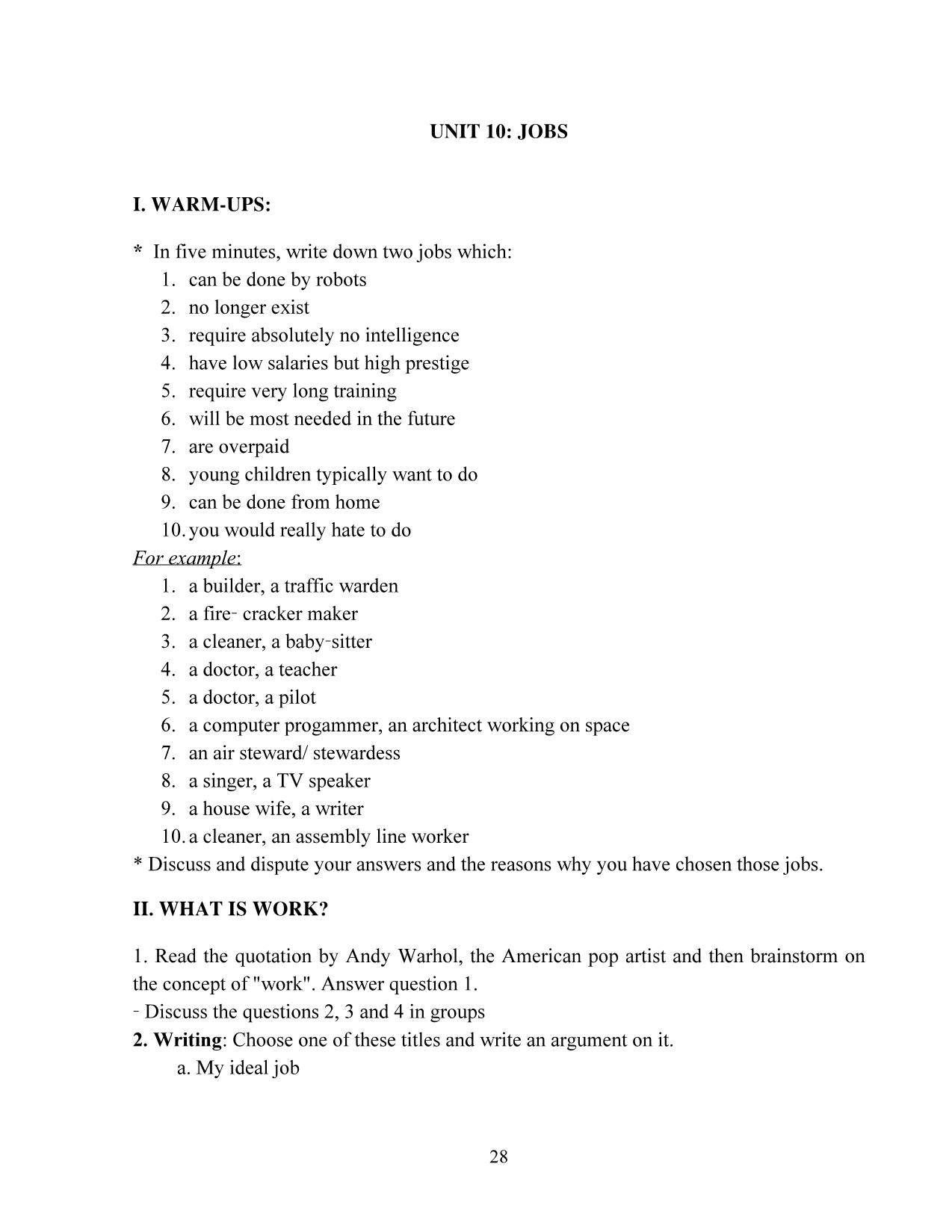
Trang 1
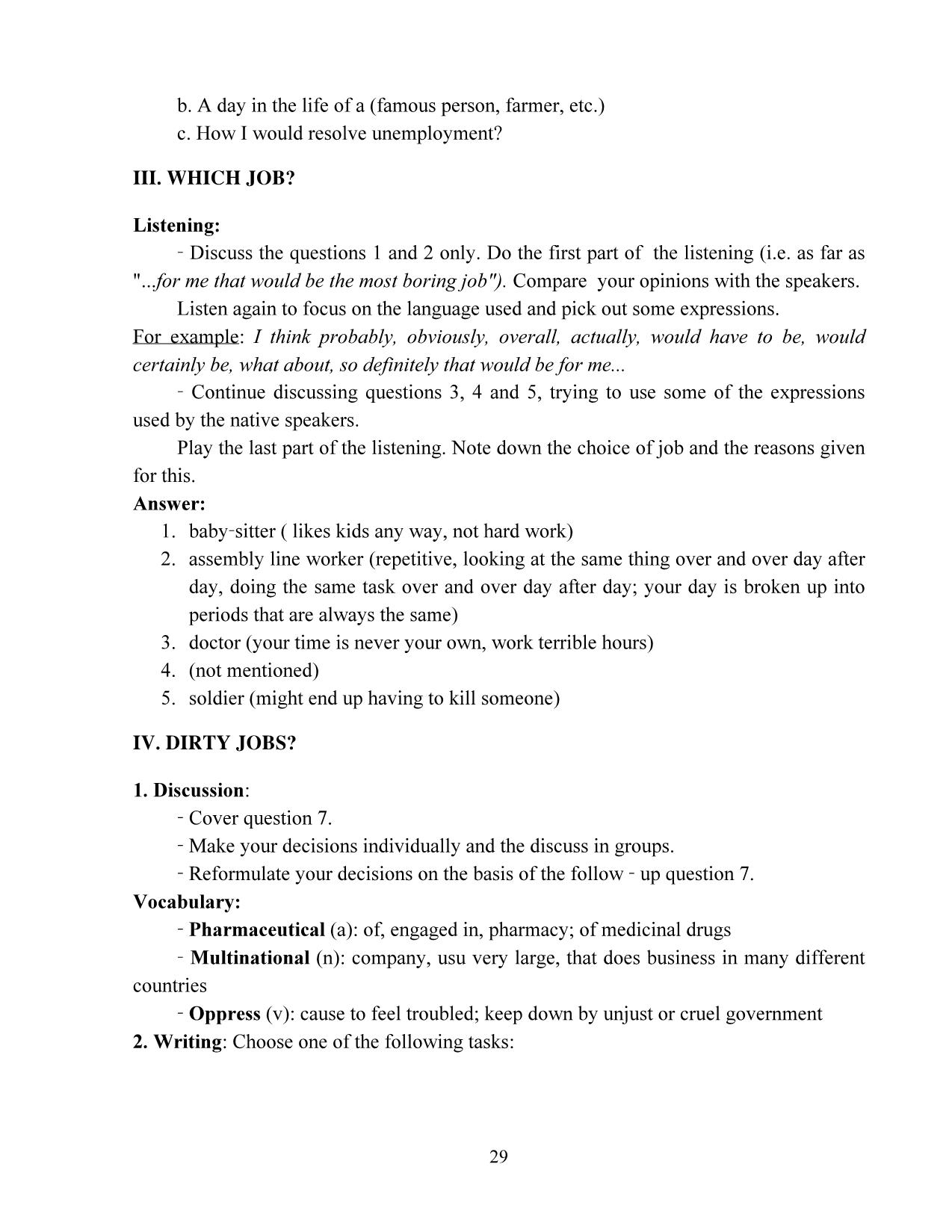
Trang 2
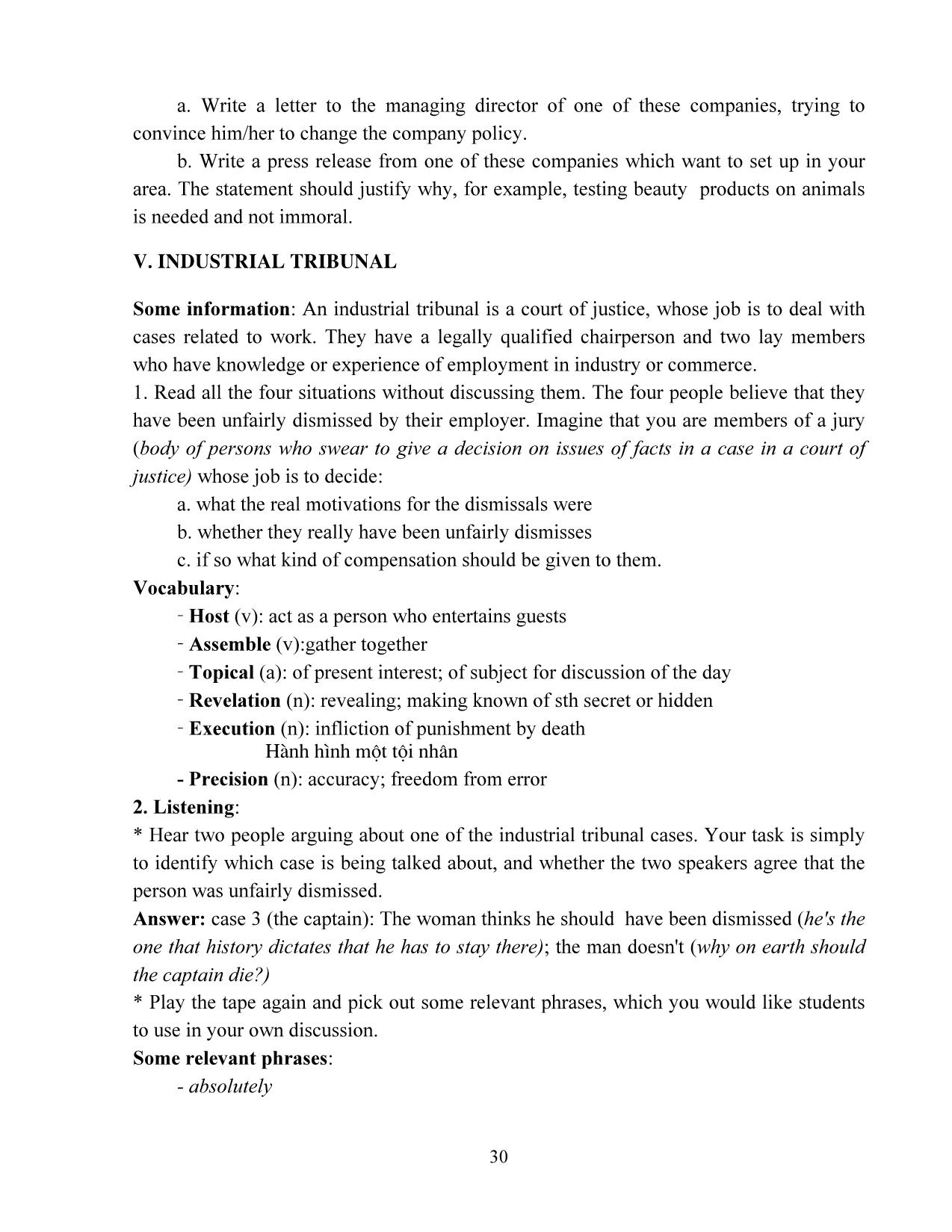
Trang 3
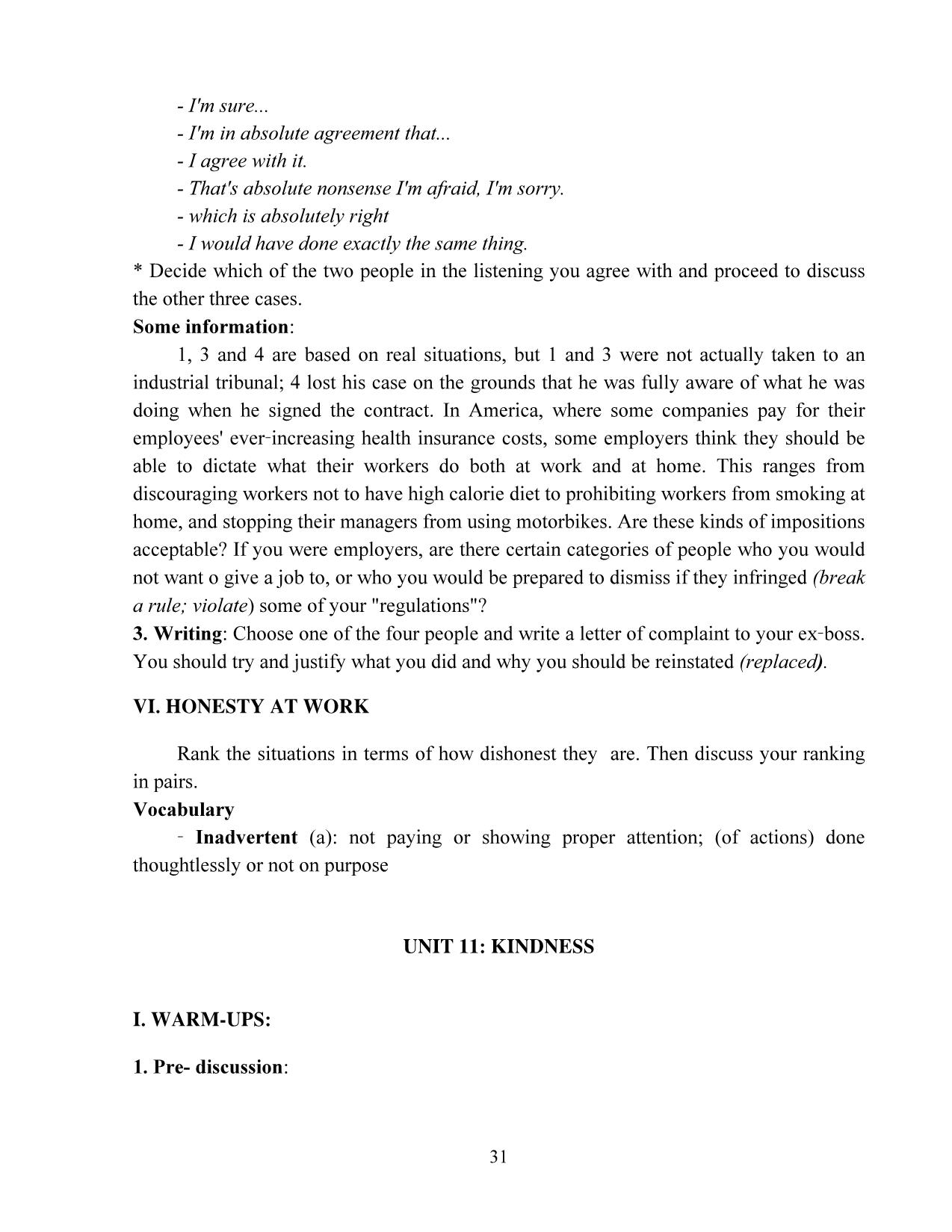
Trang 4
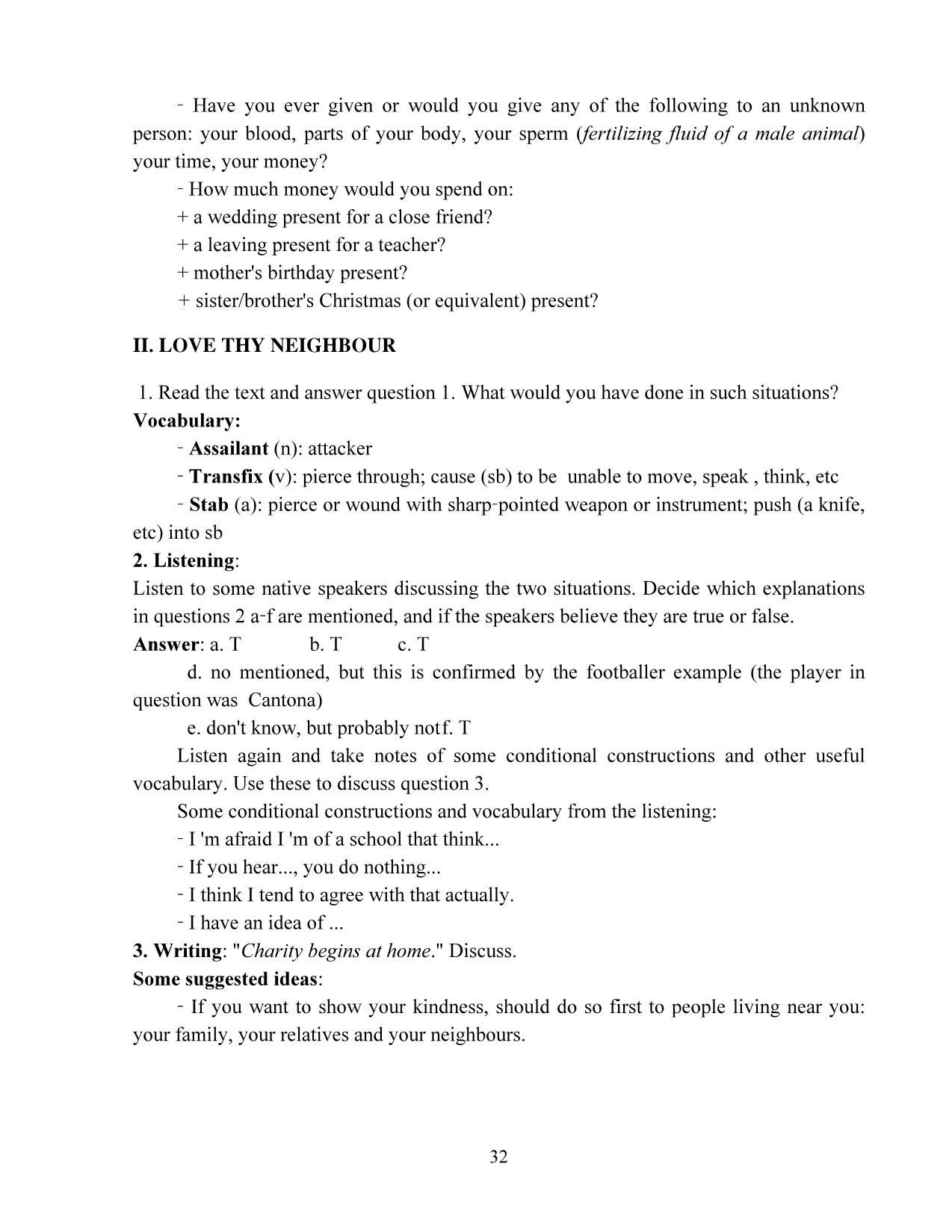
Trang 5
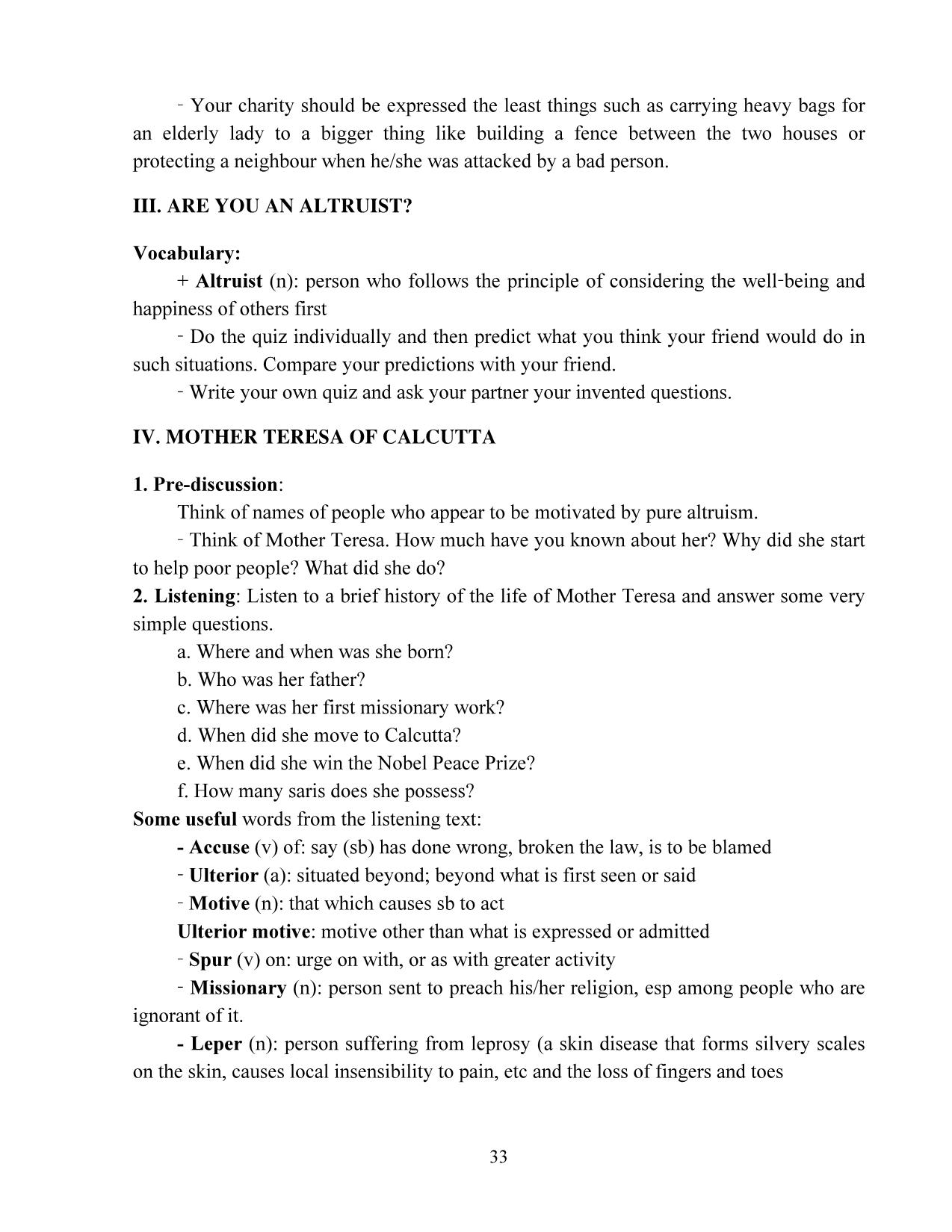
Trang 6
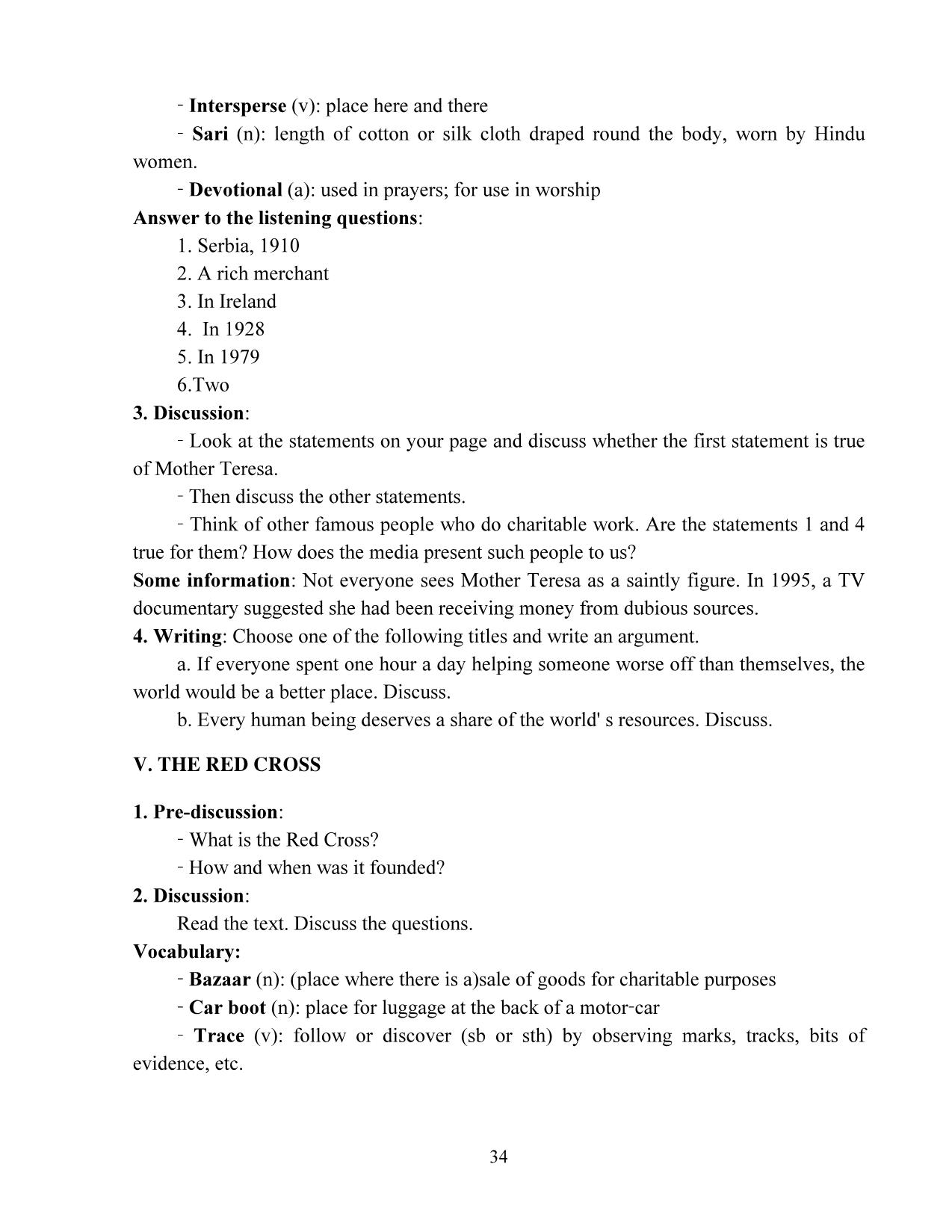
Trang 7
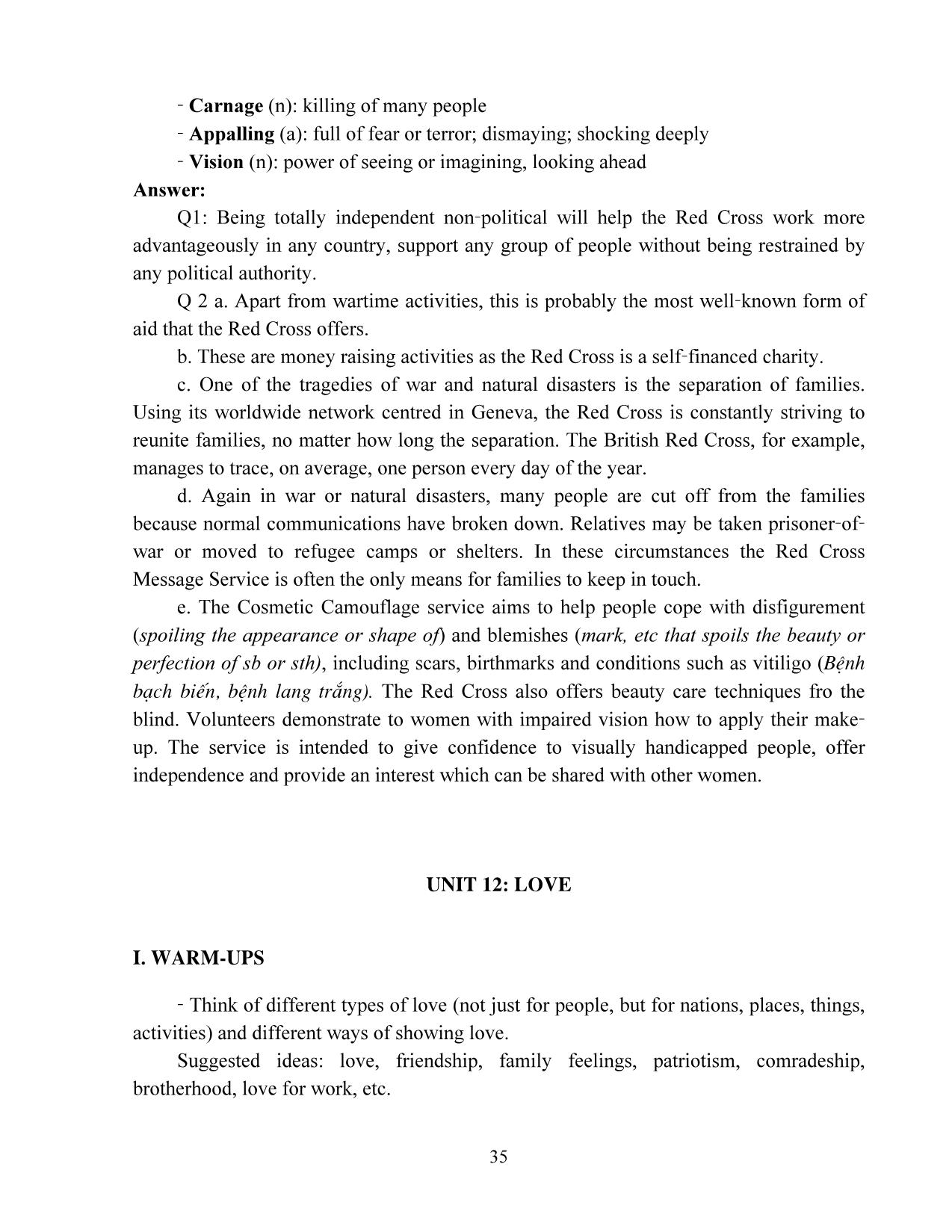
Trang 8
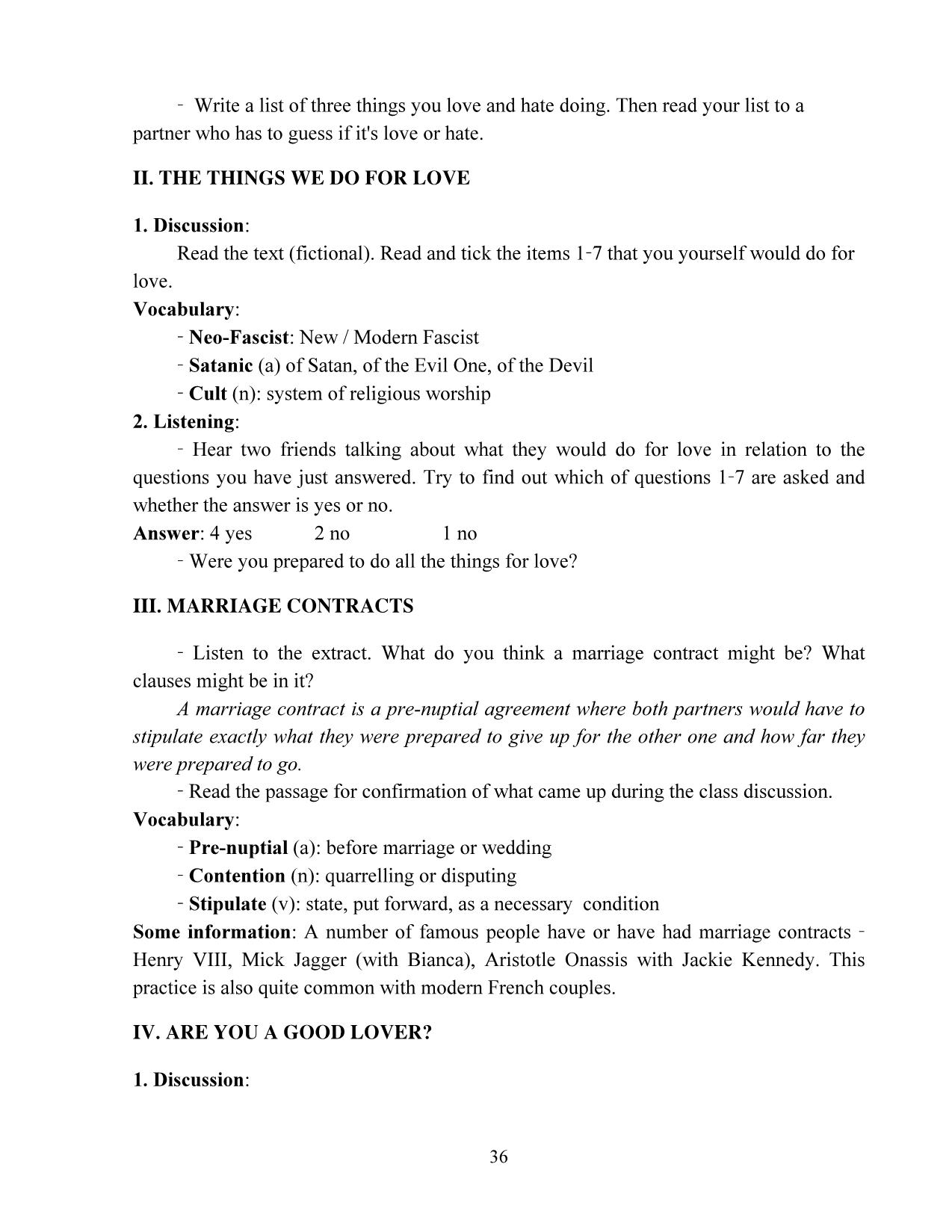
Trang 9
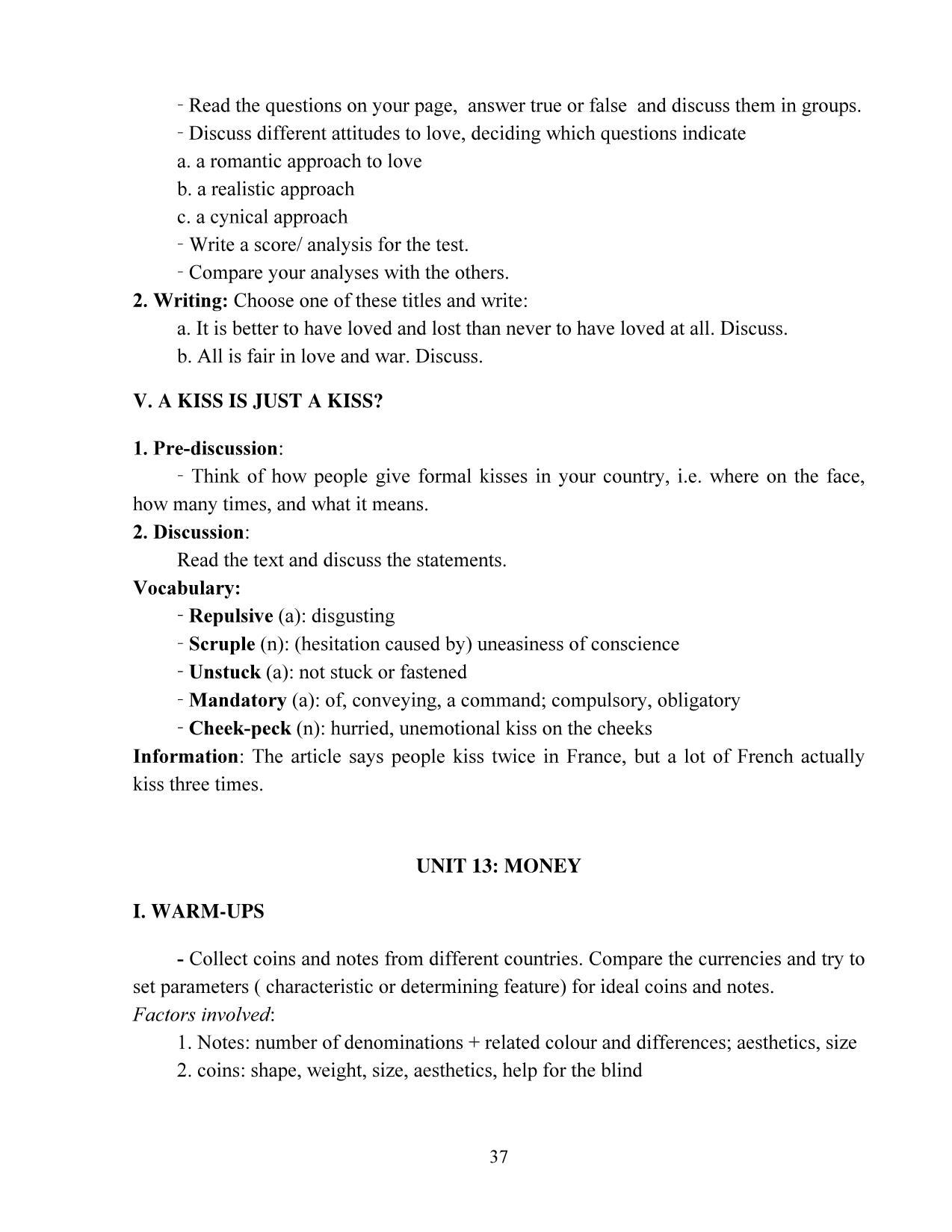
Trang 10
Tải về để xem bản đầy đủ
Tóm tắt nội dung tài liệu: Giáo trình Speaking 3 (Phần 2)
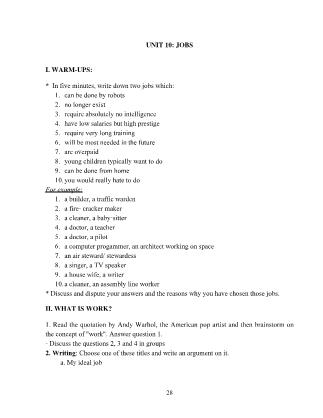
e and then compare and justify your choices. - Answer the questions. 2. Writing: - Write down a few examples from your answers to questions 1 and 5, e.g. I wish I didn’t have to..., They wanted me to... Some information: (4) “I want doesn’t get” is a typical parent’s reply to a child who says “I want an ice- cream.” rather than “Can I have an ice-cream?” However, the idea here is to discuss those things that children wish for but parents refuse to buy (e.g. I wanted my parents to get me a metal detector, they refuse so I sold a gold coin I had and bought one. I then found a cache of Roman coin and two swords!” (8) This sentence could be a wonderful philosophy for life. Basically, rather than trying to get what you want (you’ll want more in any case), you should enjoy and appreciate the things you already have and future things you may get. But it does not mean blind and resigned acceptance of your situation. V. WASTE NOT WANT NOT - Guess how much rubbish your family produces every year. - Then refer to the bin statistics on your page. You can also see Britain’s record of dumping waste into the North Sea and Irish Sea. These statistics relate to the early 1990s and have been considerably rounded; the situation has improved a little since then. - Now you do the quiz in pairs. You should decide whether your partner is a waste or not. Do you think that a waster is a “good for nothing person”? Some information: Recycling also saves considerably on air and water pollution. For instance, producing steel from scrap reduces air pollution by 85 % and water pollution by 76 %; for recycling paper, the reductions are 74 % for air pollution and 35 % for water pollution. UNIT 24: XENOPHOBIA I. WARM-UP - Think of adjectives which describe personality. When you have a fairly long list, try to associate a nationality with the characteristics and say the reasons why you think so. 67 II. THE ENGLISH - This extract comes from a book by an English person satirizing (...) the English way of life. It is by no means intended as a serious piece, nor does it necessary reflect the views of the majority of English. - Read the text and discuss the questions. Vocabulary: - Xenophobia (n): irrational hatred or fear of strangers or foreigners TÝnh bµi ngo¹i - Enduring (a): lasting - Perpetrate (v): commit (a crime, an error); be guilty of (sth wrong) - Indigenous (a)(to): native, belonging naturally (to) - Contempt (n): condition of being looked down upon or despised; disregard or disrespect - Fastness (n): stronghold; fortress; the quality of being fast - Aptness (n): state of being quick-witted III. APARTHEID 1. Discussion: - Brainstorm on the meaning of apartheid and the injustices that blacks suffered. Apartheid (n): “apartness”, racial segregation of whites, Africans, Coloureds and Indians. - Read the text. Vocabulary: - Menial (a): suitable for, to be done by, a household servant - Roll (n): official list or record, esp of names - Impose (v):lay or place a tax, duty, etc on; force sth on sb - Premise (n): statement on which reasoning is based - Subservient (a): giving too much respect to; useful as a means to a purpose; subordinate or subject to - Absurd (a): unreasonable; foolish; ridiculous - Concede (v): admit, grant, allow - Turn over (v): (cause to) fall over, upset; change the position of 2. Listening: Hear a white South African (of English origin now living outside South Africa, but has a Zulu daughter-in-law who is a member of parliament) talking about what blacks 68 couldn’t do in South Africa before the elections in 1994. Your task is to write down what these things are. Vocabulary: - Hold down (v): oppress, keep down or under Answer: + They weren’t allowed the same jobs as whites. + They weren’t allowed to build houses. + They had to use separate entrances in post offices. + They couldn’t eat in white restaurants. + They weren’t allowed to sit with white people in parks, bus stops, etc. + They couldn’t go to white cinemas or use the white public transport. IV. RACIAL DISCRIMINATION? 1. Discussion: - Read the six situations on your page and in groups • Decide which of the situations you believe are the examples of racial discrimination and why. • Discuss: Should the offenders be prevented from what they do and should they be punished? Vocabulary: - Sketch (n): short, humorous play or piece of writing - Repatriate (v): send or bring sb back to his own country - Adverse (a): unfavourable; contrary or hostile to Some information: Situation 1: According to the British Race Relations Act (1976) a landlord or landlady who lives on the premises has the right to choose who they want to live in their house. Situation 2: A director is within their rights to do this. Situation 3: This horrifying but true story is recounted in Hanif Kureishi’s introduction to the filmscript of My Beautiful Laundrette. Think how geography and history should be taught, e.g. in England and America history tends to be taught from the white man’s point of view, thus Native Americans may be badly represented in the US, and Indians the same in England. Should we try and teach history from all points of view? Situation 4: With reference to the 1960s Kureishi had this to say about British TV:” Television comics used Pakistanis as the butt of their humour. Their jokes were highly 69 political: they contributed to a way of seeing the world. The enjoyed reduction of racial hatred to a joke did two things: it expressed a collective view (which was sanctioned (given a right or permission given by authority to do sth) by its being on the BBC), and it was a celebration of contempt in millions of living rooms in England. I was afraid to watch TV because of it; it was too embarrassing, too degrading. The word “Pakistani” had been made into an insult. It was a word I didn’t want used about myself. I couldn’t tolerate being myself. The British complained incessantly that the Pakistanis wouldn’t assimilate (absorb ideas, knowledge; make or become like). This meant that they wanted the Pakistanis to be exactly like them. The British were doing the assimilating: they assimilated Pakistanis to their world view. They saw them as dirty, ignorant and less than human- worthy of abuse and violence.” Situation 5: In 1965 the British politician Enoch Powell said with reference to immigrants: “ We should not lose sight of the desirability of achieving a steady flow of voluntary repatriation fro the elements which are proving unsuccessful or unassimilable.” Situation 6: This is known as “reverse discrimination” and is not permitted by the Race Relations Act. Some years ago, a white English man applied for the job of gardener at Leicester City Council. He sent off six identical letters. In three. He used his own name, and failed, but when he used the name Prakesh Patel, he was granted an interview. He threatened to take the council to an industrial tribunal, but in the end the case was settled out of court. 2. Writing: “A multicultural and multilingual society is a much healthier society than a one race language society.” Discuss. V. LANGUAGE Read the text and then answer the questions in groups. Vocabulary: - Mandatory (a): of, conveying, a command; compulsory; obligatory - Kinship (n): relationship by blood; similarity in character * For more ideas, refer to unit 29 “Violence can do nothing to diminish race prejudice” in the book For and Against by Alexander, L. G. 70 UNIT 25: YOU I. WARM-UPS Imagine you have to break the ice with a new acquaintance. You have to write down ten questions to ask this person, so that from the answers you can an overall picture of this person. Some suggested ideas fro the questions: best friend, favourite toys as a child, most interesting thing they have learned from life, person they admire most, hopes for the future, worst/best day in their life, favourite sport/ food/ drink/ music/ book/ city etc. II. YOU ARE WHAT YOU HAVE 1. Discussion: - Write down the four most important things you have. * Most people often include four types of possessions: body part or intellect, objects, places and time periods, people and pets. - Then compare your list with your partner’s. - How did you define “have”? - What did you give preference to? - What does this tell you about your and your partner’s personality? 2. Listening: You will hear some people who have just done the above exercise. Your task is to note down the two people’s “haves”, and whether the third person approves of these “haves” and why. Answer: 1. family, friends, car 2. health, friends and cats; approves because they are not materialistic 3. Reading and discussion: Read the text and answer the questions in groups. 4. Follow-up - In groups, one student takes out the content of his/her pockets/bag/wallet/case. The other student try to classify these objects and draw some conclusions about the lifestyle and personality of the student. He/She then comments on their observations. III. HAVE YOU EVER? 1. Discussion: 71 - Answer the questions in pairs or groups. 2. Listening: Listen and match the extracts with the questions a-t. Answer: 1. a 2. a 3. m 4. q 5. i 6. e 7. k IV. WOULD YOU EVER? Answer the questions in pairs or groups. V. FEELINGS 1. Discussion: Answer the questions in pairs or groups. 2.Listening: Listen to someone doing the same exercise. Your task is to match the answers with the questions in the exercise. Answer: 1. d 2. b 3. f 4. h 5. i 6. g 7. j VI. SUPERLATIVES Answer the questions in pairs or groups. UNIT 26: ZOOLOGY I. WARM-UPS - You draw very quickly two domestic and two wild animals, try to draw the animals which are unfamiliar and difficult to guess. In small groups, pass round your drawings and guess what your partner’s animals are, giving reasons and commencing: “it could be a goat”, “it looks a bit like...”. “it can’t be a bird because it doesn’t have wings”. Within the groups, you compare impressions and then the “artist” reveals the truth. - Write down the names of the first three animals that come into your heads, then three adjectives to describe each animal (i.e. the total is nine adjectives). In groups of four, pass your papers to the person on your right. This is a psychological game. The first animal with the corresponding adjective describes how you see yourself, the second how you wish you were, and the third how you really are. 72 Each student read as follow: “Lucas sees himself as a dog, he wishes he were a lion, but he really is a mouse.” II. ZOOS 1. Reading and discussion: - Read the text and answer the questions - Brainstorm the reasons for zoos. Vocabulary: - Undignified (a): not showing proper dignity; clumsy - Penned-up (a): being shut up in, or as in, a pen - Demean (v): lower oneself in dignity, social esteem 2. Listening: Listen to Dr Katz, an advocate of certain kinds of zoos, and answer these questions. Questions: True or false? 1. Dr Katz approves or modern farming methods. 2. Up to 15 % of the world biological diversity may have been lost by the end of the 21st century. 3. Animals are responsible for eating a lot of crops produced by third world farmers. 4. San Diego zoo specializes in breeding endangered species and reintroducing them into their natural environment. 5. Dr Katz agrees that it is better to visit animals in their natural habitat. Answer: 1. F 2. F 3. F 4. T 5. F 3. Writing: “Would you rather be a lion tamer or a lion hunter?” Discuss. III. THE LAWS OF THE JUNGLE? 1. Discussion: - Read the six situations on your page. - Imagine you are members of a civil jury whose job is to sentence the six people in the situations. Decide beforehand what range of sentences can be given, including acquittal (judgement that a person is not guilty). refer to question 1, do you think that these types of dogs should be banned from domestic use? Vocabulary: - Maul (v): hurt or injure by rough or brutal handling - Maim (v): wound or injure so that some part of the body is useless 73 - Ember (n): small piece of burning wood or coal in a dying fire; ashes of a dying fire - Poacher (n): person who takes sth illegally 2. Writing: Write a letter of protest to one of the following governments: The Chinese /Taiwan governments to get them suspend trade in powders made from tiger bone (used for quasi medicinal purposes) and rhinoceros (thick-skinned, heavily built animals of Africa and Asia with one or two horns on the snout) horn (aphrodisiac); these have been banned by the UN convention on International Trade in Endangered Species. IV. ANIMAL RIGHTS 1. Discussion: - Think about how we mistreat animals. Think on the areas: battery hens, bullfighting, force-feeding geese, horse-racing and horse-jumping, circuses, hunting, killing for furs, whaling, etc. - In groups, discuss your attitudes to such activities. Would it be right for the European Parliament to ban bullfighting in Spain? Do we have the right to change other nations’ traditions? How much do animals actually suffer? Is keeping a dog in a town apartment any worse than hunting foxes? - In groups, now look at the statements on your page and decide whether they are true or false. Some information: Pharmaceutical companies wishing to introduce a new drug on to the market have to provide scientific evidence of its safety by getting their drug licensed. This requires toxicology (branch of medical science dealing with the nature and effects of poisons) testing which in the UK (and many other countries) entails tests on animals. Apparently, 450 million animals are killed fro food each year and another 7 million are destroyed as vermin (wild animals harmful to plants, birds and other animals) or unwanted pets. 2. Writing: Write a letter to a pharmaceutical company asking them to stop testing their products on animals. Then write a reply from the public relations officer of that company. V. PETS Read the text and answer the questions in groups. - Snarling (a): (of dogs) show the teeth and growl (at) 74 - Bare (v): uncover, reveal - Bungalow (n): small house of only one storey - Dam (n): barrier built to keep back water and raise its level (e.g. to from a reservoir, or for hydro-electric power) - Attendant (n): servant or companion - Spaniel (n): sorts of dogs with short legs, long, silky hair and large, drooping ears - Lochside (n): by the side of a lake 75 ChÞu tr¸ch nhiÖm néi dung: Ts. NguyÔn v¨n hßa Biªn tËp: Tæ c«ng nghÖ th«ng tin Phßng kh¶o thÝ - ®¶m b¶o chÊt l−îng gi¸o dôc 76
File đính kèm:
 giao_trinh_speaking_3_phan_2.pdf
giao_trinh_speaking_3_phan_2.pdf

